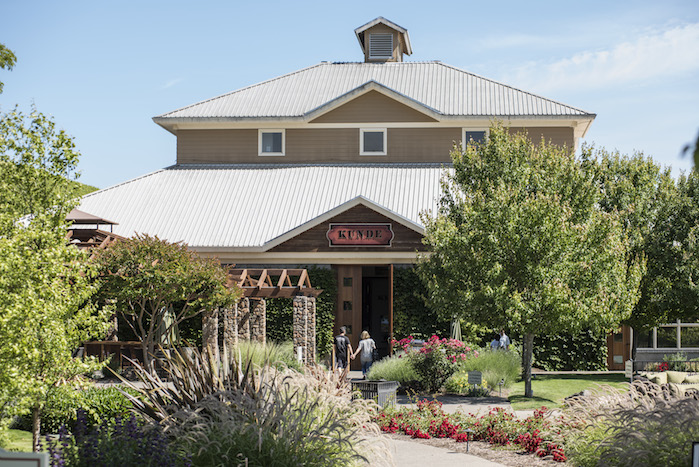I recently caught up with Jeff Kunde, Chairman of the Board of Kunde Family Winery, in the middle of his 2017 harvest to discuss sustainable wine practices.
Jeff is a fourth-generation winemaker and has been very involved in green practices at the winery. Kunde was the first winery to be certified as sustainable in the State of California. The Winery also received the prestigious Governor’s Environmental and Economic Leadership Award in 2008 (“GEELA”).
Jonathan Newman: Thanks for taking time from harvest to tell me about Kunde Winery’s sustainability efforts. Can you provide some history about the winery?
Jeff Kunde: Right now it is two separate businesses. My great-grandfather bought the original property in 1904. There was a winery there, and they kept the winery going through till the late 40s. From that time moving forward it was about acquiring more land and we got to our current size of over 1,850 contiguous acres in the Sonoma Valley. Then in 1990, we decided to build a modern winery. Since then, we separated the winery into two businesses. We have the wildwood vineyards and the Kunde Family vineyards.
I’ve been with the company since day one; I helped build the winery in 1989. Prior to that I was involved with the cattle operation and then did vineyard work. We grew up as kids working in the vineyards, and I got an agricultural degree at Chico State University in 1978.
I’ve got stuff in my cellar that my great-grandfather made in the 1960s. We even have one of the original bottles in display at the winery from the 1940s. Under the Kunde brand, we produce 70,000 cases, but we also have secondary labels and produce many more cases through Vintage.
JN: Tell me about your sustainability practices at the winery.
JK: When these programs started coming out, we looked at how to farm sustainably. And it is not just farming; it’s everything you do in all aspects of your business. We started moving more to that approach. The thing we like about sustainability is that it is all encompassing. It’s about everything that you do. When you’re certified, they are looking to see if you are doing continuous improvement. It’s about giving back to the community, and we really like those reasons.
There are basically three things they look at: environmentally friendly practices, being socially equitable and economic feasibility. You have to be able to afford sustainable practices, and do what is right for the people as well as the environment. I think that’s one of the differences between organic and biodynamic, it’s just different farming practices. But sustainability is about everything you do, and that’s why we like it.
JN: Can you explain what socially equitable means?
JK: It’s what you give back to the community. We have our employees in a safe environment. It’s also about education. We do hiking programs and education programs so that people can learn about what’s going on in the vineyards.
JN: Does being certified sustainable make the wine taste better?
JK: Yes, because we are using minimum amounts of sprays and pesticides. We are also focused on farming the soil, which includes composting, cover cropping and getting more wildlife in the vineyard. We do believe this leads to better fruit.
As chairman of the Pennsylvania Liquor Control Board, Jonathan Newman was the nation’s largest wine buyer and brought a number of popular innovations to bear, including the Chairman’s Selection program and opening of local stores for Sunday sales. Follow him on Twitter at @NewmanWine and visit his website: www.newmanwine.com.






